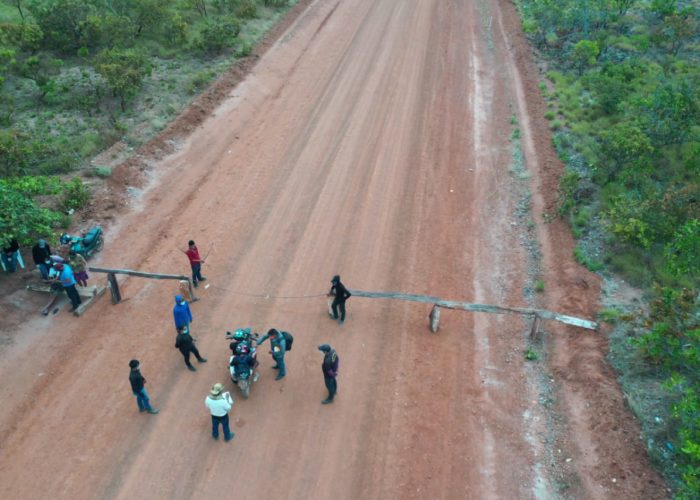Gold mining in the Serra do Atola, Raposa 2 community, in the Raposa Serra do Sol Indigenous Territory. Photo credit: CIR
Gold mining brings prospectors, disease, and destruction to indigenous lands with a history of fighting back in Brazil
By Teresa Tomassoni
Valério Eurico can hardly sleep these days in Raposa II, an indigenous village in Brazil’s northern state of Roraima. The crackling of gunfire and non-stop noise of generators running throughout the night in a nearby illegal gold mining site permeate the walls of his home.
“You hear the sounds of motorcycles, generators and machinery pounding the rock,” the indigenous Macuxi leader says, who lives just a few kilometers from one of the numerous illegal mining operations that have made wastelands of large swaths of Raposa Serra do Sol, an indigenous territory his ancestors have fought to protect for generations. “This is disturbing as this goes on 24/7.”

As if the sounds were not enough to keep him awake, knowing that small children are being burdened with breaking and carrying rocks alongside their parents like slaves in the mines also keeps him awake at night.
These families, some of whom are indigenous, are chasing illusory dreams of prosperity promoted by Brazil’s President Jair Bolsonaro, says Valerio, who serves as a regional coordinator for the Indigenous Council of Roraima (CIR), which recently submitted a report on the impact of illegal mining in the region to the Office of the United Nations High Commissioner for Human Rights.
“It’s the richest area in the world,” Bolsonaro said in 2018, referencing Raposa Serra do Sol, which is 6,500 mi2 and home to around 27,000 indigenous people. “You can explore it rationally. On the Indians’ side, paying them royalties and integrating them with society.”
Gold rush drives hopes, leaves broken dreams and poisoned landscape instead
But, the backbreaking labor involved in mining for gold and other metals like niobium has yet to benefit indigenous people in the region. And the environmental and social impacts of these illegal operations have been devastating.
“They have destroyed everything. Everyone has seen how they have destroyed the forest. It looks empty. It’s not the same as when we used to care for it. What there is is more trash, lots of trash everywhere,” says Valerio.
Federal police records indicate only 4 percent of all profits made from mining activity in the area stay within the local community. The rest goes back to the entrepreneurs who are financing these operations, many of whom are also involved in the drug trade, according to CIR’s report sent to the United Nations.
Bolsonaro’s rhetoric has fueled a surge in illegal mining in indigenous territories throughout Brazil in recent years, and the Covid-19 pandemic has further exacerbated the situation. As gold prices soared and national lockdowns curtailed both federal and local efforts to monitor and resist illegal land invasions, tens of thousands of illegal miners, known as garimpeiros, flooded indigenous lands. An estimated 20,000 miners have occupied Yanomami territory this last year, which, according to a recently released report published by the Instituto Socioambiental, has led to a 30 percent increase in Amazon rainforest deforestation in the region.
Today, the invasion of around 2,000 illegal miners in Raposa Serra do Sol reminds leaders like Valerio, 60, of the seemingly never-ending battle his community and others have had to fight in order to protect and live off of their land.
Illegal mining is the latest threat in a long, hard-fought battle for territorial recognition
It took thirty years to demarcate Raposa Serra do Sol and have it officially recognized by the Brazilian government as indigenous territory in 2005, and another four years to completely oust non-indigenous illegal rice growers from the territory. The Rainforest Foundation US (RFUS) has supported CIR in achieving such victories for more than 20 years by helping build its legal team and strategy used to defend the demarcation of their territory and protect its leaders on the frontline of this ongoing battle for land rights. Today, RFUS continues to support CIR in its efforts to protect and care for the people and land of Raposa Serra do Sol.
Currently, RFUS is helping to implement a reforestation project in the territory, which includes a program for youth to study agroforestry and traditional seed saving methods. But, RFUS is especially focused on assisting CIR to develop community monitoring teams, which will employ environmental specialists, security personnel and paralegal agents to prevent and address illegal mining activity in the region. This project still needs funding to be fully implemented, says Rainforest Foundation’s Program Director, Christine Halvorson. And time is of the essence.
“Mining has a tremendous impact on the forest and on people’s health,” says Halvorson.
Clean water becomes a scarcity
Surviving in Raposa Serra do Sol becomes more difficult with each day that illegal mining continues in the territory. The days of traditional fishing or hunting of the world’s largest rodent, the capybara, are over, according to Valerio. Some local rivers and lakes have either dried up completely as a result of miners redirecting the flow to serve them in their operations, or become so contaminated with mercury that bathing or eating anything from the water is no longer safe in many communities which have experienced illegal mining invasions.
The poisonous water has led to babies being born with defects. Traditional land crops of manioc, which is used to make tapioca and a flat bread called beiju, are also yielding less due to the toxic water, says Maria Betânia Mota, a Macuxi leader who serves as CIR’s general secretary of the indigenous women’s movement.
“Mother nature is sacred to us and it will always be sacred because we need it day after day not only for our sake — for the sake of indigenous people — but for the sake of every human. We all need nature,” says Maria Betânia.
Maria Betânia, Valerio and other CIR leaders are doing everything they can to preserve the nature they hold sacred and inspire local communities to do the same, including educating communities about their rights and the politics that threaten them.

In fact, CIR leaders are helping coordinate teams of volunteer community monitors to block more miners from entering their territory. Blockades have been built at strategic points, barring the transference of mining equipment and alcohol.
Others are learning how to use drones and cell phones to document any illegal, or other suspicious activity, which will be collected by CIR and used as evidence to help build legal cases against the miners. Maria Bethânia, herself, is learning how to use a drone so she can teach other women how to operate the technology. But, she says, there is currently a limited supply of equipment and an urgent need for more to document the extent of illegal activity in the territory without having to get too close to the action, which could endanger the monitors.
Already, Valerio and other leaders and their family members have been threatened for organizing community members against the miners. Just last month, miners threatened to shoot him. But, Valerio remains undeterred.
“I am not scared of dying. I am willing to do whatever it takes to save my people,” he said. “I pray everyday when I go to work, because if I have to give my life for my people, I will.”








